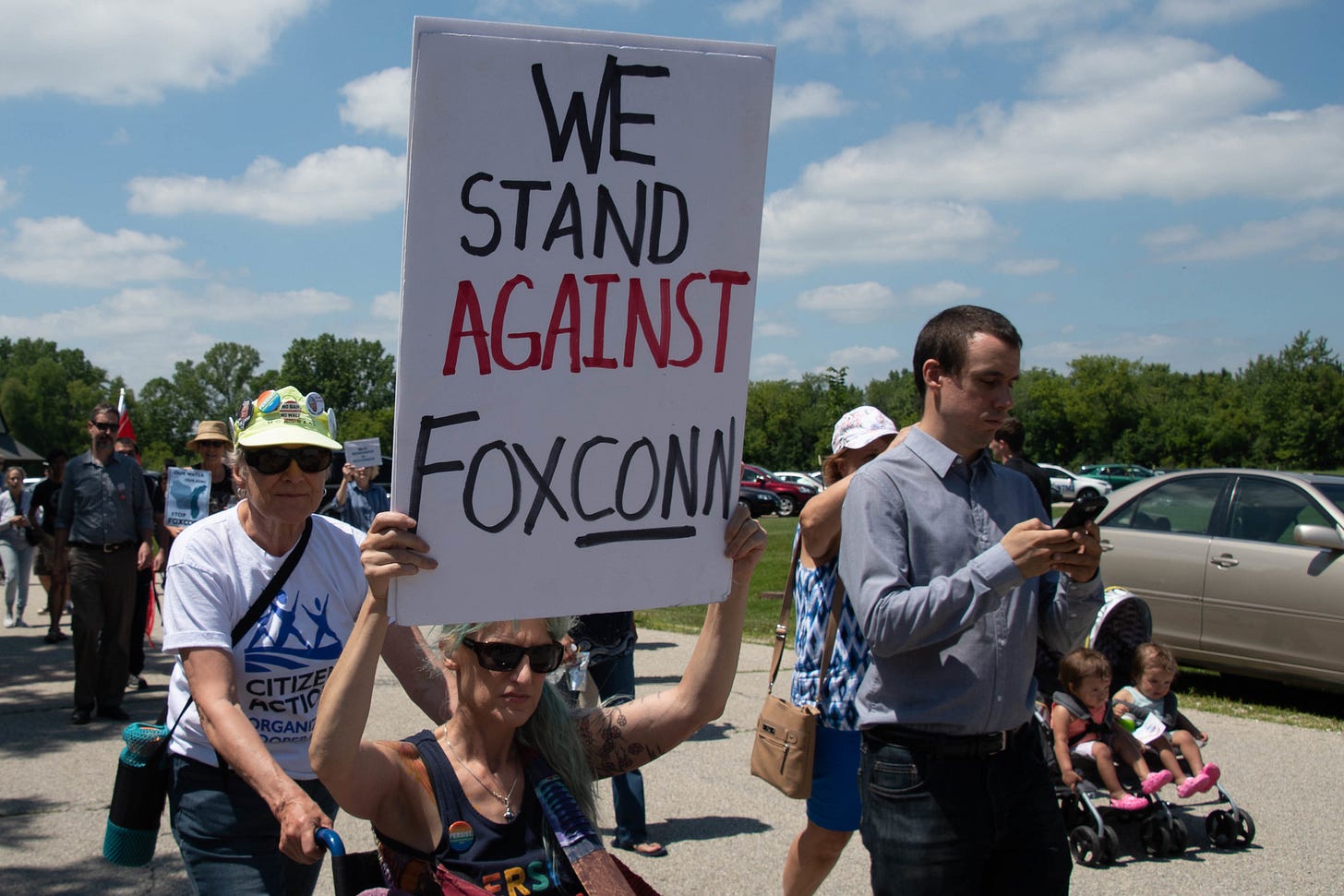
Just about all of the focus on the Trump administration at the moment is, rightfully, on impeachment. But we’re also all living in Trump’s economy and, shock of shocks, it has problems too, so I hope you’ll forgive the clickbaity headline and hang with me here.
When the next recession comes, perhaps someday soon, it will be deeper and more painful due to decisions the Trump administration (and, to be fair, a whole bunch of state lawmakers) have made.
Which brings me to Foxconn. A huge part of Trump’s election campaign in 2016 was telling white people in the Midwest that he alone could bring back the manufacturing economy that decades of bad trade deals, bad tax policy, and a hefty dose of corporate consolidation and greed allowed to evaporate or be shipped off to China. A crowning piece of that was a deal Wisconsin cut with the Taiwanese manufacturer Foxconn for a new plant and 13,000 good old-fashioned blue-collar jobs.
Trump of course took credit for the deal, calling it the “eighth wonder of the world” — a moniker he also bestowed on one of his now-bankrupt Atlantic City casinos — and even went out to Wisconsin for the plant’s groundbreaking. Then-Wisconsin Gov. Scott Walker promised Foxconn some $3-4 billion in incentives.
Since then, to put it bluntly, the deal has gone to crap. It’s a textbook study in how everything I write about in this newsletter happens.
First, Foxconn has consistently flipped and flopped on what, exactly, its new Wisconsin facility will actually be and how many jobs it will create there. The initial 13,000 number was whittled down to 1,000 white-collar positions, then re-inflated, and now resides who knows where. As the Washington Post detailed this week, residents in the county where the future facility will be located have repeatedly had their hopes raised and then dashed by Foxconn’s ever-shifting plans. Current Wisconsin Gov. Tony Evers, who ran as a skeptic of the deal, admits he has no idea what Foxconn has in mind at this point.
One big problem with corporate subsidy deals is that lawmakers, corporate executives, and local media all act as if the promises companies make are set in stone. But they never are. Economic factors change all the time, and thus business plans change too. Even if some portion of the subsidies due to a company are tied to certain benchmarks, as they are in the Wisconsin case, other payouts such as infrastructure improvements are made regardless of whether or not the company follows through on its promises.
The size of the facility and how many people it will employ also determines how cost effective the subsidies Foxconn receives will be. According to an analysis by Tim Bartik of the Upjohn Institute, Foxconn’s scaled-back plans raise the cost per job created to nearly $300,000 on the high end.
Now, that’s not the most outrageous cost out there — New York recently cut a deal with the nanotechnology company Cree, Inc. that will cost it $814,000 per job created — but it’s still a whole lot of money. As Bartik wrote, “The incentives are so costly per job that it is hard to see how likely benefits will offset these costs.”
The state could just directly hire three people for $100,000 each instead of laundering its job creation through Foxconn. For context, Wisconsin’s typical incentive deals cost $28,000 per job created.
But that’s not the end of the woe Foxconn is sowing. There are environmental concerns, as the plant could cause increased flooding. Eminent domain is being used to claim land in a haphazard manner, displacing residents — again, problematic when there’s no clear cut plan for what the final plant will look like.
And finally, a state audit showed that Wisconsin is not very good at checking up on the promises companies make in order to receive subsidies, handing out cash even when those promise are unfulfilled. So there’s every reason to believe Foxconn could fail to create the jobs its supposed to and receive its tax breaks anyway.
With the U.S., as one analyst put it, having “tariffed our way into a manufacturing recession,” new manufacturing facilities would be great news. But instead of creating a national industrial policy, the Trump administration merely cheerleads deals like the one Wisconsin cut with Foxconn, or Indiana cut with Carrier, or Texas cut with Apple, that inevitably wind up worse for the taxpayers than early headlines or fancy press releases would have you believe, while willy-nilly applying tariffs with no actual policy outcome in mind.
It’s not am impeachable offense, but it’s definitely offensive policymaking.
Thanks for reading this edition of Boondoggle. If you don’t subscribe already, just click the green button below. And if you liked this post, take a moment and click the little heart under the headline. It helps.
If you do subscribe, please send this around to friends, family, neighbors, or whoever you think might like it, and tell them to sign up too. Finally, if you’d like to pick up a copy of my book, The Billionaire Boondoggle, go here.


